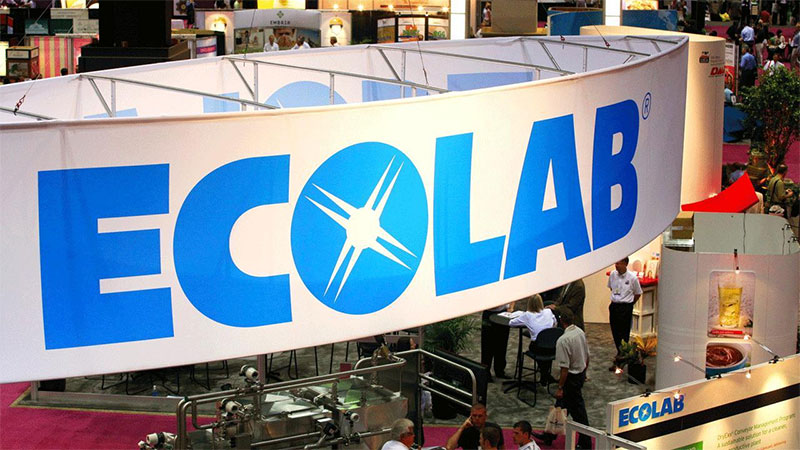A third of food is wasted each year – and Ecolab has solutions

Water sanitation innovator Ecolab is featured in new report by responsible investing leader Regnan which outlines four areas of investment in sustainable agriculture.
ECOLAB’S mission is clearly spelled out on its website – it simply wants to make the world a better place.
The NYSE-listed company is a world leader in water sanitation and the prevention of food borne pathogens.
Ecolab is a vital link in the global food chain by helping prevent food loss to spoilage.
The business is featured by responsible investing leader Regnan in new report that outlines four areas for investment in sustainable agriculture (find the report here).
Food waste occurs at every stage across the food supply chain – from growing to packing, processing, distributing and retailing.
A key cause of food waste is food pathogens – microorganisms like viruses, yeasts and moulds that can spoil food, taint water systems and contaminate equipment.
Food waste is one of the most pressing problems humans face. Close to one third of all food produced each year is lost to waste.
Source: FAO 2011, Regnan 2020
The global economic, environmental and social cost of food wastage is estimated at an annual US$2.6 trillion, which is nearly equal to the GDP of France and about double the total annual food spending in the US.
In the US alone, it is estimated that a 20 per cent reduction in food waste over the next 10 years would avoid almost 18 million tonnes of greenhouse gas emissions annually – equivalent to removing about 4 million cars from the road.
“The way that we feed the world’s population is a key part of the solution for climate change,” says Mohsin Ahmad, Regnan fund manager and co-author of the report Catalysing Sustainable Agriculture and Food Production.
Prevention of pathogens across food system value chains also benefits human health. The US Center for Disease Control and Prevention estimates that each year there are some 48 million cases of foodborne illness.
Ecolab has a goal of helping its clients provide high-quality and safe food to 1.8 billion people by 2030 and to prevent 11 million foodborne illnesses.
Today, Ecolab’s food safety products are used in more than 36 per cent of the world’s packaged food and 44 per cent of the global milk supply.
Ecolab is a holding in the Regnan Global Equity Impact Solutions Fund.
You can find a copy of the Regnan Catalysing Sustainable Agriculture and Food Production here.
Who is Regnan?
Regnan is a responsible investment leader with a long and proud history of providing insight and advice to investors with an interest in long-term, broad-based or values-aligned performance.
Building on that expertise, in 2019 Regnan expanded into responsible investment funds management, backed by the considerable resources of Pendal Group.
The Regnan Global Equity Impact Solutions Fund invests in mission-driven companies we believe are well placed to solve the world’s biggest problems.
The Regnan Credit Impact Trust (available in Australia only) invests in cash, fixed and floating rate securities where the proceeds create positive environmental and social change.
Both funds are distributed by Pendal in Australia.
Find out about Regnan Global Equity Impact Solutions Fund
Find out about Regnan Credit Impact Trust
For more information on these and other responsible investing strategies, contact Head of Regnan and Responsible Investment Distribution Jeremy Dean at jeremy.dean@regnan.com.
Regnan’s focuses is on delivering innovative solutions for sustainable and impact investment, leaning on over more than 20 years of experience at the frontier of responsible investment. “Regnan” is a registered trademark of Pendal.
The Regnan business consists of two distinct business lines. The investment management business is based in the United Kingdom and sits within J O Hambro Capital Management Limited, which is authorised and regulated by the Financial Conduct Authority and is registered as an investment adviser with the SEC. “Regnan” is a registered as a trading name of J O Hambro Capital Management Limited.
The investment team manages the Regnan Global Equity Impact Solutions (RGEIS) strategy, which aims to generate market-beating long-term returns by investing in solutions to the world’s environmental and societal problems. The RGEIS strategy is distributed in Australia by Pendal Fund Services Limited.
Alongside the investment team is the Engagement, Advisory and Research (EAR) team of Pendal Institutional Limited in Australia, which has a long history of providing services on environmental, social and governance issues. While the investment management team will often draw on services from and collaborate with the EAR team, they remain independent of the EAR team and are solely responsible for the investment management of the RGEIS strategy.
The Regnan Credit Impact Trust (available in Australia only) invests in cash, fixed and floating rate securities where the proceeds create positive environmental and social change. Regnan Credit Impact Trust is distributed in Australia by Pendal.


